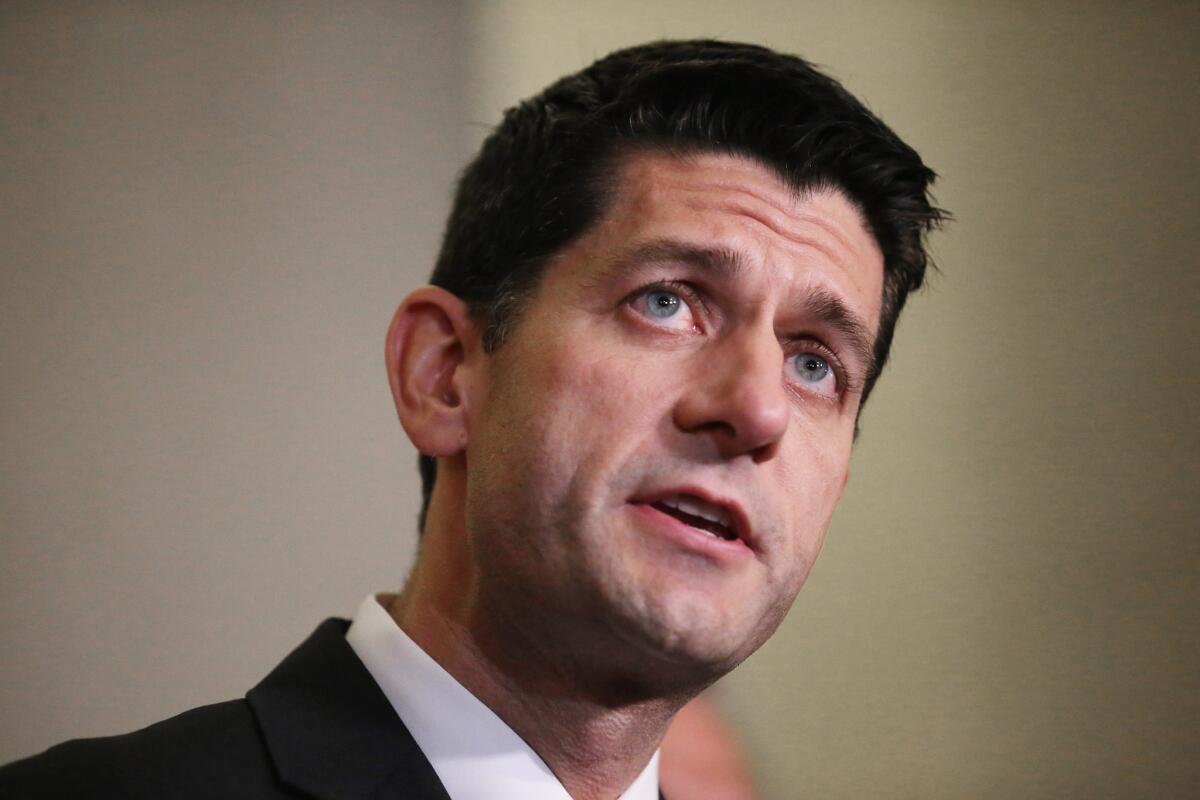House approves two-year budget deal

Rep. Paul D. Ryan, expected to be the next House speaker, said he decided there were “few good options” and would back the House budget agreement.
Reporting from Washington — The House approved a two-year budget deal Wednesday as retiring House Speaker John A. Boehner sought to quell the bitter budget battles that defined his tenure and provide a smoother transition for his likely successor, Rep. Paul D. Ryan.
The $80-billion bipartisan accord between congressional leaders and President Obama reverses steep spending cuts to defense and domestic programs, and staves off hits to Medicare and Social Security disability benefits.
It also raises the federal government’s borrowing limit through March 2017, well after the presidential election.
The bill passed 266 to 167. Every Democrat voted for the deal, as did 79 Republicans. Most GOP lawmakers voted no. The Senate is expected to approve the deal.
It’s time for us to turn the page on the last few years and get to work on a bold agenda we can take to the American people.
— Rep. Paul D. Ryan
“We’re pleased,” said House Minority Leader Nancy Pelosi (D-San Francisco). “It’s a compromise.”
The vote comes as Ryan moved closer to becoming the new House speaker, winning an internal Republican nominating election for the job he never wanted but is now eager to embrace.
The 45-year-old former GOP vice presidential nominee won the majority threshold by loosely uniting the party’s often-warring wings of conservatives and more mainstream lawmakers.
Behind closed doors, signs of GOP unrest were evident. Ryan won 200 votes, well over a majority of the House Republicans, but fewer than the 218 he will need in the upcoming floor vote. Still, even those who voted against him believe he will prevail.
A final floor vote for speaker is set for Thursday, almost ensuring the Wisconsin congressman will replace Boehner, the Ohio Republican who called it quits rather than continue clashing with hard-right lawmakers.
“The selection of Paul Ryan as our next speaker marks an important step toward unifying our conference,” said House Majority Leader Kevin McCarthy (R-Bakersfield), who stepped aside from the leadership race when it became clear he would have difficulty building a cohesive majority.
Boehner wanted to “clean up the barn” for Ryan, believing the $80-billion deal would help end the budget standoffs that stymied much of his own time as speaker.
Ryan, though, said the closed-door deal-making process “stinks.”
The last-minute budget accord between Boehner and the White House left Ryan forced to choose between conservatives who oppose the deal and a bipartisan array of lawmakers who are expected to approve it.
Early Wednesday, Ryan said, he decided there were “few good options” and he would back the deal.
“It’s time for us to turn the page on the last few years and get to work on a bold agenda we can take to the American people,” Ryan said.
Now Ryan, who would become the youngest speaker to take the gavel since 1869, is poised to begin his leadership career at odds with the same far-right faction that forced Boehner out.
A small but influential group of about 40 conservative Republican lawmakers in the House Freedom Caucus split over Ryan’s leadership, with some backing another candidate for speaker, Rep. Daniel Webster (R-Fla.).
The Freedom Caucus remained united, however, against the budget deal. It “continues the sad pattern of the past five years: a fiscal monstrosity gets negotiated in secret,” the group said.
Rep. Paul Gosar (R-Ariz.), a member of the Freedom Caucus who voted for Webster and opposed the budget deal, would have preferred to see Ryan stand firmly against it.
“It’s tough when you see deals like the crap we have today,” Gosar said. “You can’t keep doing that.”
Ryan appears to have escaped much of the blame for the budget deal. He remains popular as the party’s fiscal guru and architect of the steep budget cuts and Medicare overhaul in the GOP budget.
“This is Boehner’s baby,” Rep. Tim Huelskamp (R-Kan.), a Freedom Caucus member, said of the compromise.
The accord pushes most of the budget battles off until after the 2016 presidential election.
But the threat of a possible government shutdown remained as Congress still must pass bills to fund the government at the new spending levels. The first test will come Dec. 11, when current funding expires.
“We’re in a more unified phase, but we still have big issues to deal with,” said Rep. Charlie Dent (R-Pa.).
ALSO:
How the South undoes New York’s efforts to regulate guns
Paul Ryan poised to become House speaker after winning internal GOP vote
Deputy fired for throwing student from her desk, even though ‘she started this,’ sheriff says
More to Read
Sign up for Essential California
The most important California stories and recommendations in your inbox every morning.
You may occasionally receive promotional content from the Los Angeles Times.











